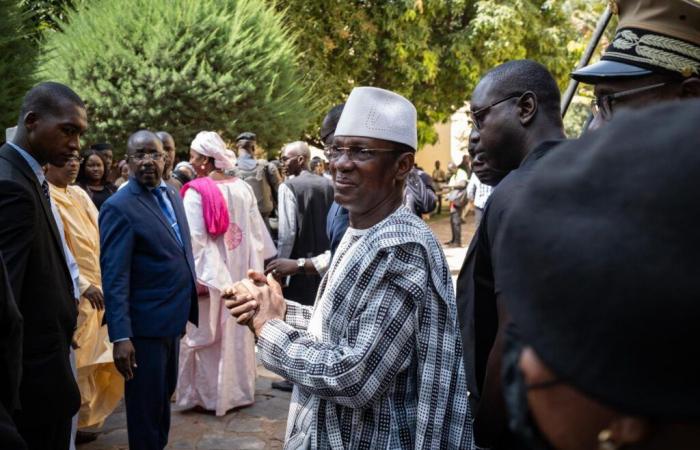Following criticism against the military power in Mali, the civilian prime minister, Choguel Kokalla Maïga, was dismissed by the junta on Wednesday, November 20, as well as his government, according to a decree read on state television. “The functions of the Prime Minister and members of the government are terminated”says the decree of the head of the junta, General Assimi Goïta, read by the secretary general of the presidency, Alfousseyni Diawara.
Mr. Maïga, appointed to his post by the military in 2021 following the second coup in a year, appeared isolated, with limited capacity for action. His dismissal, however, creates additional uncertainty in an already troubled context. Some of the main members of the junta, such as General Sadio Camara, minister of defense, and General Ismaël Wagué, minister of reconciliation, are part of the government.
Mr. Maïga was dismissed four days after having made rare criticisms of the junta in public on Saturday. He deplored being kept away from decision-making regarding the maintenance of the generals in power and mentioned “the specter of confusion and amalgamation” which would, according to him, hover over the current so-called transition period.
Read also | Article reserved for our subscribers In Mali, Bamako suffers its first large-scale jihadist attack since the junta came to power
Read later
The withdrawal of Barkhane, an “abandonment in mid-flight”
The junta at the head since 2020 of this country facing jihadism and a deep multidimensional crisis has failed to fulfill the commitment it had initially made under international pressure to return power to elected civilians in March 2024. No new deadline is not fixed.
Choguel Kokalla Maïga, 66, was the civilian face of the strategic pivot made by the military which broke the historic alliance with the former French colonial power and turned politically and militarily towards Russia.
Read also | Article reserved for our subscribers The Wagner method, serving Russian ambitions in Africa
Read later
Mr. Maïga was at the United Nations in September 2021 and delivered one of the most notable harbinger messages of this pivot by denouncing what he presented as the“abandonment in mid-flight” that constituted the announced withdrawal of the French anti-jihadist force Barkhane after years of fighting alongside Malian forces. This withdrawal pushed Mali to explore new avenues with other partners, he said, while the deployment of elements of the controversial Russian private paramilitary group Wagner was looming.
Several times minister and three times presidential candidate (2002, 2013 and 2018), Mr. Maïga provided the junta with a form of support as a figure of the June 5 Movement-Rally of Patriotic Forces (M5-RFP). This collective took part in the protest against former civilian president Ibrahim Boubacar Keïta, finally overthrown by the military in August 2020.
Towards a candidacy for the next presidential election
Mr. Maïga, however, distanced himself from the junta, sparking speculation for months about his dismissal. In June, he endorsed the content of a text signed by a relative firmly opposing the possible retention of the military in power for several more years. This relative, Boubacar Traoré, was sentenced in July to one year in prison. Before him, Abdelkader Maïga, another loyalist of the former prime minister, was sentenced in April to two years in prison, one of which was closed, for defamation.
Following his comments on Saturday, Choguel Kokalla Maïga's position became difficult to maintain. An influential supporter of the junta, the Collective for the Defense of the Military, whose demands have often been met in the past, demanded his resignation within seventy-two hours. Demonstrations of admittedly limited scale took place on Tuesday to support the military regime and demand the resignation of the Prime Minister.
Stay informed
Follow us on WhatsApp
Receive the essential African news on WhatsApp with the “Monde Afrique” channel
Join
Mr. Maïga's statements have drawn strong attacks on the consistency of his attitude. They gave rise to conjectures about a possible positioning on his part with a view to a future presidential election. Mr. Maïga is also the target of criticism from former allies of the M5-RFP, who accuse him of having abandoned the fight for change and of acting on his own behalf.






